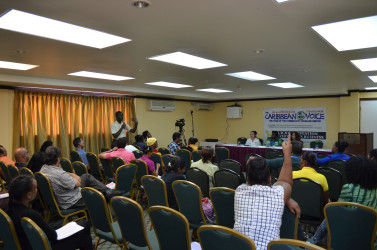Suicide and its root causes were at the centre of discussions when several non-governmental organisations (NGOs) gathered at the Cara Lodge last Friday to discuss and draft an action plan dealing with the issue.
The one-day conference was organised by Caribbean Voice and saw the presence of Minister of Public Security Khemraj Ramjattan, Minister of Social Protection Volda Lawrence and invitees from various NGOs around the country.
The aim of the event was to initiate a national conversation on suicide and related issues, such as domestic and other forms of violence, teenage pregnancy, rape, drug abuse, and family and relationship issues, in hopes of creating a comprehensive report to tackle the issues on a national agenda.

Last year, the World Health Organisa-tion named Guyana as the country with the highest estimated suicide rate in the world for 2012.
The discussions between the groups covered a SWOT format where the strengths, weaknesses, opportunities, and threats were listed and discussed for each of the four areas: Suicide, Sexual Crime, Abuse, and Drugs and Alcohol.
“We are listening so we can gather the information that the other groups have to offer so we can have a collaborative solution,” Norkah Carter, a mental health councillor from Indiana, who helped spearhead the event, told Stabroek News.
She said the event will highlight the issues that certain communities and NGOs are facing on an everyday basis and there would be a collaborative effort to tackle the issues.
“We are not pointing a finger at Guyana, we just want it to shine again,” she said, while also pointing out that Guyanese are carrying their “bad” behaviours abroad.
Carter applauded the recent efforts that have been taken so far in tackling suicide, such as the implementation of the suicide hotline but said that in order to affect the suicide rate the roots must be tackled.
“I am not concerned with the highest suicide rate and statistics. I want to focus on the problem on a general basis,” she said, while noting that while the highest suicide numbers can be linked to a specific, culture, race, and region, people need to accept it as a countrywide problem.
“We have a culture of secrecy and when something like that happens, family members often rush to bury it. I’m not saying that we should abandon our cultures. Of course not, but we should all embrace our nationality and accept that the problem infects our entire society,” she added.
Unacceptable
Carter also raised the issue of sexual violence and rape. While there are other major root issues that affect suicide on a whole, she said the rate at which the “reported” rape rate is increasing and the way that Guyana treats sexual violence and rape victims are unacceptable. “You look at the numbers and you’re astonished, and that’s just the ones that are reported,” she said.
“There’s no concerted plan on how to deal with the issues. You cannot shame and blame someone who has been raped. There needs to be some sort of security network for the victims, especially children,” she stated, while highlighting that one of the major problems with the issue is the pace and effort with which the justice system treats such cases.
She highlighted issues such as the lack of skilled professionals to address the situation, lack of access to needed resources, insufficient prevention and awareness raising programmes, resigned acceptance by too many victims, and too many unreported cases being the main reasons why sexual violence and rape are allowed to settle and eventually be forgotten.
“Most people who are assaulted sexually see the person a lot during their life. Think about that, think about how that person would feel and what do you think happens to them? It drives them to the extreme measure,” she said.
Some suggestions were put forward at the conference to tackle sexual violence, including making sexual crimes a more critical and highlighted issue; the establishment of a registry of sex offenders; sensitivity training for police and health care workers; and development of a crisis network.
After the discussions were completed, a report was compiled for presentation to Minister Lawrence for follow-up action.




